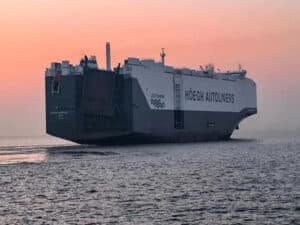
Split Euro Parliament emissions decision threatens shipping
Written by Nick Blenkey
DECEMBER 15, 2016 —The Danish Shipowners’ Association reports that the European Parliament’s Environment Committee has decided to call for the inclusion of maritime transport in the EU Emissions Trading Scheme (ETS). The vote went against the advice of the European Parliament’s Industry Committee, which voted to keep shipping out, only a month ago.
The Danish Shipowners’ Association says it regrets that MEPs chose regionalism over global progress.
Under a vote adopting the Environment Committee position, shipping would be included in the EU Emissions Trading Scheme (ETS) by 2023, should there be no global agreement under IMO in operation by 2021.
The opposing positions adopted by the Environment Committee and the Industry Committee leaving Rapporteur Ian Duncan (ECR, UK) with a difficult mandate in upcoming negotiations with the Council and the Commission.
The European Community Shipowners Association (ECSA) explains what happened this way:
“The Environment Committee (ENVI) of the European Parliament adopted today its report on the revision of the EU Emissions Trading System (ETS). MEPs agreed on a compromise text for shipping, which puts pressure on the International Maritime Organization (IMO) to have a system comparable to ETS operating for global shipping as from 2021. If that is not the case, then shipping will be included in the European ETS as from 2023. Part of the revenues generated from ETS will be channeled through a Maritime Climate Fund to improve energy efficiency and invest in innovative technologies for ports and short sea shipping.”
The ENVI report needs to be confirmed in a plenary vote in the beginning of next year. Negotiations will then start with Member States and the Commission.
“We hope the unhelpful position of the ENVI Committee can be overturned in this process”, said ECSA Secretary General Patrick Verhoeven, “The EU should engage in the global dialogue, not undermine it.”
The deadlines included in the ENVI vote show lack of understanding of the international climate roadmap warns MEP Bendt Bendtsen from the Christian-Democratic group, EPP, Member of the Industry Committee.
“By calling for an ETS for shipping should no international system operates by 2021, my colleagues have unfortunately chosen to cave in to regionalism and ignore the long-term impact for European growth and the environment. With only a small part of global shipping touching EU ports, ETS will miss the intended climate target and runs the risk of derailing the IMO process.”, says Bendt Bendtsen. “I can only say that the Industry Committee stands firmly behind its call for shipping to be addressed internationally, otherwise it may well lead to cargo being transshipped outside of Europe with direct impacts on European employment. I will personally follow the regulatory developments at regional and international level very closely.”
With a split European Parliament, the EU Member States will have a key role to play in securing that maritime transport is not included in the final legislation, expected to be adopted by the second quarter of 2017.
The European Parliament’s call for inclusion in ETS comes at a pivotal time where Danish shipowners have agreed to reduce emissions in pace with the rest of the world to reach the goals of the Paris Agreement. This will mean that shipping – as the rest of the economy – needs to become CO2 neutral by the second half of this century.
“The vote would have been a perfect opportunity for MEPs to show support for the international progress, and hold IMO accountable to its timeline. Instead we end up in a confrontation with the international negotiations in IMO, which neither serves the climate nor the sector. Danish Shipowners will nonetheless maintain an ambitious climate policy and work for continued progress in IMO,” says Simon C. Bergulf, Director EU Affairs for the Danish Shipowners’ Association.
Shipping and the EU’s ETS
Set up in 2005, the European Emissions Trading Scheme (ETS) works by putting a limit on overall emissions from covered installations, which is reduced each year. Within this limit, companies can buy and sell emission allowances. ETS has since its inception come under heavy criticism and in 2015 the EU launched a legislative proposal to enhance cost-effective emission reductions and low-carbon investments.
Because shipping is by nature a global and highly mobile industry, the European Commission decided that it would not include shipping in ETS. This was recently mirrored at the international level at IMO, where a mandatory data collection system and a clear deadline for a maritime CO2 strategy were adopted in October 2016.
The IMO roadmap foresees the adoption of an initial strategy in 2018 to be followed by a final agreement on targets and measures, including an implementation plan, in 2023, which is fully consistent with the Paris Agreement.





Leave a Reply
You must be logged in to post a comment.